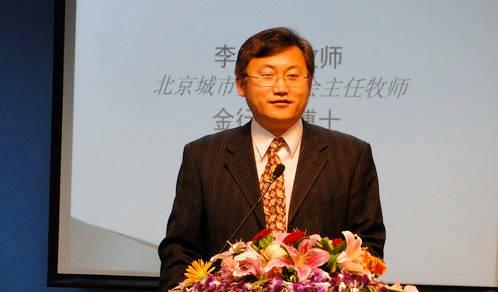The first mobilization meeting of "2030 Mission China" was held in HK from September 28th to October 1st. Nearly 1000 pastoral staff from the Chinese house church and the ecumenical church gathered together to look out on the future of China's transformation from a mission-receiving country into a mission-sending country.
After hearing Luis Bush's motivational messages on the first night, who is a World Mission Strategist, Pastor Daniel Li, a Chinese House Church leader, continued a keynote speech to share his "2030 Mission Strategies" at the beginning of the meeting. He started his speech by describing "2030 Mission China" from four parts, that is, Vision Origin, Four Strategies, Concrete Strategies, and Future Expectations.
During the speech, he referred to the possible realistic and achievable historical background of "2030 Mission China" as well as Eight Specific Strategies. According to Eight Specific Strategies, Pastor Daniel Li planned out the "Four Five-Year Plan" as a development outlook.
Pastor Li came to know Jesus Christ when he was in Tsinghua University in 1990. Thus, he found the answer for his life. Later on, he was called to participate in establishing the Great Commission Fellowship on the Divine Land. He is the secretary-general now. He also established the Beijing Revival Church, which is one of the house churches in Beijing City. What's more, he once took part in the preparatory work of the Third Lausanne Committee for World Evangelization in China. Currently, Pastor Li is furthering his degree of Doctor of Ministry in Logos Evangelical Seminary in North America.
At the beginning of his Speech, Pastor Li shared his outlook to the next 15 years at first. He believes that there is great significance of China's Global Missions Movement in the next 15 years. China used to be a mission-receiving country, what we need to do now is to transfer China into a mission-sending country.
The vision origin of "2030 Mission China": 20,000 foreign missionaries have been sent to China in the last 200 years. The Mission China 2030 challenge is to see at least 20,000 Chinese missionaries overseas by the year 2030:'We owe a "gospel debt" to the world. Only when our missions sending surpasses what we have received can China be considered truly a mission-sending country.' "The future Mission China will become as a Church of Great Mission. And this is exactly our vision." Pastor Li summarized the vision of Mission China accurately. In Pastor Li's opinion, China needs to send at least 20000 missionaries and thus deserves the definition of Mission China.
Can China send 20,000 missionaries in 15 years? Is that possible?
This is the second question raised by Pastor Li. The current number of overseas missionaries sent from China is around 500. While the goal of 20,000 in 15 years seems to be ambitious,
Then he gave his answer: Yes, we can. Because South Korea, our neighboring country, has set us an example. In the 1990s, the Korean church declared a bold vision to send 10,000 missionaries by the year 2000. They miraculously reached their goal in a decade and then doubled to 20,000 missionaries by 2010. Chinese leaders believe their goals to be very attainable with one distinct advantage: China has seven times the Christian population of South Korea.
Pastor Li uses data to further explain this point, "Let's assume that there are 60 million church followers in China at present. It will increase to 100million by 2030. According to the number of followers,1 out of 5000 people can be sent as a missionary, then we can send 20000 missionaries by the year of 2030. What are the coming background conditions of Mission 2030?
"Then on what reason and opportunity can we prove that we can make the Mission China 2030 realized." Pastor Li continued to raise the third question so as to lead the audience to pay attention to the historical background of China which produces abundant opportunities for the China Church.
First, Christian congregations, in particular, have skyrocketed since churches began reopening when Chairman Mao's death in 1976 and keeps growing.
Second,30 years of reform and opening up in China has not only promoted the comprehensive development of China but also promoted Chinese into the world.
Third, the economy of China has maintained sustainable growth from the world sixth to world first. Moreover, the strategy of the Belt and Road in 2015 in China happened to coincide with years of emphasis on Mission-sending Country.
Fourth, New Media is flourishing, which is a new way to preach the gospel. Fifth, Chinese network is worldwide, Global Chinese Church is starting to connect with each other and cooperate. I think it is an important platform for Chinese Church to move towards rejuvenation.
Four Strategies and Eight Tactics of Mission China 2030
Pastor Li cited a verse in the Gospel which preached by Jesus to extend the Four Strategies and Eight Tactics of Mission China, including the Renaissance of Missionary Base, the Soundness of Missionary Framework, the Promotion of Domestic Mission, and the Promotion of Overseas Mission.
To be concluded, these four strategies need to be operated hand in hand and cultured together.
The Four Five-Year Plan of Mission China 2030
Pastor Li regarded the two-year preparation work before 2015 as a lead time of Mission China 2030.The conference was convened as scheduled, through which they witnessed God's faithfulness. At the same time, he looked into the future with the Four Five-Year Plan.
He added that Mission China 2030 has 7 Statements of Beliefs, each of them came from Bible and inherited the declaration of the theology of the Lausanne Movement and CCCOWE Movement. He wished that our Chinese pastoral staff can study these theological foundations so as to lay a solid foundation and fulfill the Great Mission. "We hope that the fourth Lausanne Congress can be held in China.










